
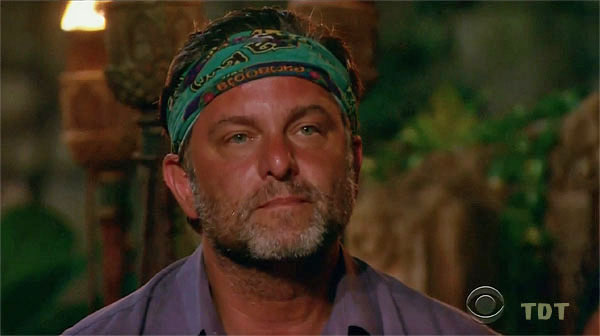
I think we’re two-for-two so far this season. Maybe it’s just me, but I don’t remember a two-episode opening as compelling as this one, at least not for a while. Of course, the last two dud seasons probably cloud my judgment.
When thinking about which theory to apply to this episode, it saddened me that social learning theory seemed the most appropriate. Why is that sad? Us mass communication folks liberally steal theories from places such as psychology, sociology, economics, political science and even other disciplines. Well, I consider myself more of a sociologist and here I am going back to psychology again. I’m betraying my roots.
Which brings us to Jeff Varner, who seemingly betrayed his roots as an “old school” player last week. But, as he told us at the beginning of this episode, he was trying to teach the old school players a lesson.
And this brings us to social learning theory. Basically, the idea of social learning theory is that we can learn by watching others do something. And we can also learn by seeing someone rewarded for their actions. So, really, what the authors of the theory argue is that we don’t just learn through behavior, through actually doing stuff, but also through simply watching others do stuff. And, many times, this type of learning is more powerful, especially compared to being simply told something.
The most famous social learning theory studies came in the early 1960s from Albert Bandura, a professor at Stanford University. Bandura conducted the iconic Bobo doll experiments. So Bandura used a group of children as his participants. He put them into groups. Some groups saw an adult being aggressive with the Bobo doll. Others saw the opposite. The kids who saw the aggression, were more likely to act aggressively toward the doll when they had their chance. Bandura and his team also manipulated rewards, meaning in some studies they provided (or didn’t provide) rewards to the adult. The idea, of course, was to show that people learn through observation, that they model their behavior after behavior they see rewarded in the real world.
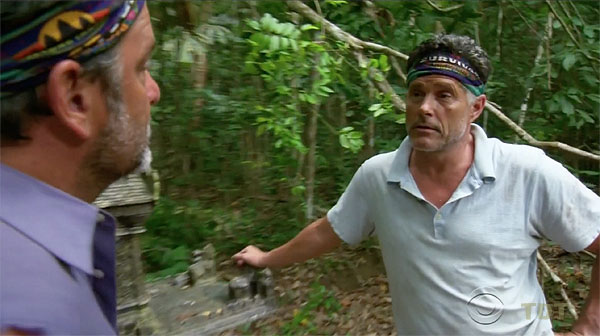
That’s where Jeff Varner comes in. He could have simply told Terry, Kelly and Woo last episode (or in their pre-game chats), that they need to play aggressively and not in the same way they did the first time, that Survivor changed since the last time they put on a buff. According to Varner, he didn’t think that would work. So he resorted to hurting his own alliance to teach them.
So what did he do? He decided to teach them a lesson. He acted a certain way and he was rewarded by being on the right side of the numbers. His choice, Vytas, went home. His old alliance of Terry, Kelly and Woo saw this.
The first we see of Terry in this episode, he’s telling us he realizes now he needs to play a different game, that this isn’t Survivor of old. He needs to be more new school.
Why does he say this? Because he learned from Varner and because Varner received rewards for his behavior, Terry now, subconsciously, knows that he needs to model his behavior after Varner’s. We see a slightly similar confessional from Kelly saying the same thing. We don’t hear it from Woo (because Woo doesn’t ever really articulate strategy, unless it’s “Whoa, dude”), but his behavior in this episode indicates he learned from Varner also. And, of course, we see Terry actually comfort Abi. Terry seems like a good guy, so he was doing the decent thing, but he also told us, the viewers, that strategy involved. Terry using strategy! Stop the presses! And thank Jeff Varner.
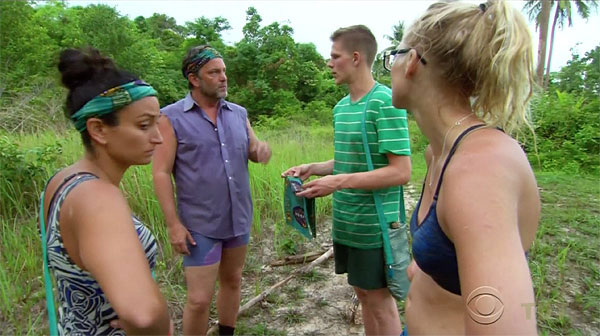
You can also make the case that Varner taught Spencer. For example, Spencer came into the game saying he would have many personal conversations. But this episode we find out he didn’t do that and now he’s on the bottom. Spencer saw Varner have numerous personal conversations and Varner’s on the top. So, eventually, we see Spencer crying, promising to have conversations with everyone. He knew the proper behavior to succeed in that tribe, but didn’t actually do it until he saw someone else rewarded for it, and he saw himself reprimanded for behaving in the opposite manner. That’s social learning theory. He didn’t learn by doing. He learned by observing. Same with Terry and the rest of the “shelter people” alliance.
Next week we’ll see if these people who have changed behavior based on what they’ve learned actually continue the change. This tribe swap gives everyone an opportunity to fall back on old habits. Of course, with Jeff Varner still around, I don’t think anyone can get comfortable. Let’s see if he’s at the fulcrum of everything next week, too. If you can’t tell, I love me some Jeff Varner this season.
No more theory. Let’s get to the part of this here column that features a quick note about where I see each remaining contestant:
Ta Keo
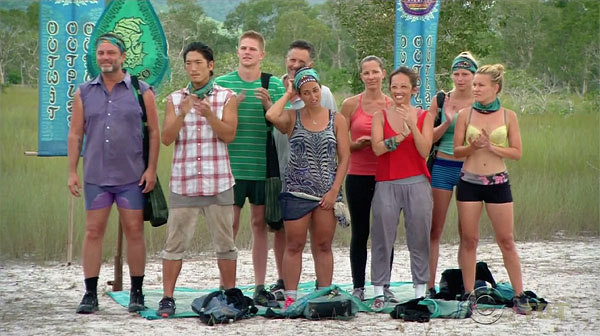
- 1. Terry — I’m not so sure what Terry did was all that strategic (in intent), but, heck, Terry’s learning. He’s playing the social game! Of course, at the beginning of the episode, he called Abi “little girl.” I’m not so sure that counts as strategic. Maybe that’s just me.
- 2. Abi-Maria — I’m on record as saying I wish she wasn’t on this season, but, man, I might be changing my mind. Yes, she’s a horrible player. And, yes, despite what people say about her in real life, she’s a horrible person on Survivor. But, if she can remain a tool for so much good drama that leads to interesting strategy, I’m in.
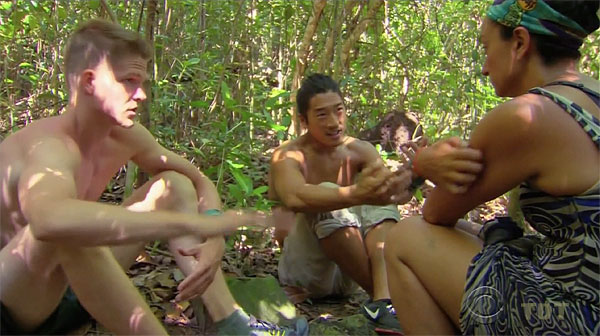 3. Woo — Holy poop. Did I see Woo actually sounding certain of something? The way he said no to Shirin and Spencer … my heart leapt. Maybe Woo has some game in him this time. Or not. I’m certainly not holding my breath.
3. Woo — Holy poop. Did I see Woo actually sounding certain of something? The way he said no to Shirin and Spencer … my heart leapt. Maybe Woo has some game in him this time. Or not. I’m certainly not holding my breath.- 4. Peih-Gee — I can’t figure out Peih-Gee. She seems perfectly happy to play the Sandra “as long as it’s not me” game. Nobody’s Sandra. But, honestly, where do Peih-Gee’s loyalties lie? I have no idea.
- 5. Spencer — Oh, Spencer, I hope you brought tissues as your luxury item. I’m just kidding. This dude always ends up on the outside looking in, though, scrambling to stay in the game but never in the know. I guess that’s a testament to his skill and, um, badness? On one hand, he’s an artist when it comes to avoiding the vote off when he’s on the chopping block. On the other hand, he’s always on the chopping block and his plans never work.
- 6. Jeff — I’m going to make a proclamation: If he doesn’t win (and I don’t think he will), Jeff Varner will play Survivor again. Why did it take so long for this second time? Did we really need Lex on All-Stars?
- 7. Kelley — I think Kelley keeps looking more and more like a winner. They way she nimbly switched her vote to not rock the boat, the way she’s cleverly staying in the background, but also making big moves. No one’s going to target her immediately, so the longer she keeps that idol, the more threatening she becomes. She may not win, but she’s getting far, right?
- 8. Kelly — I’ll just say a version of what I said last week: I’m not sure Kelly returning to Survivor is going well. I don’t know what she brings to the TV show part of it all. She’s clearly an early post-merge boot, I think. We’ll see.
Bayon
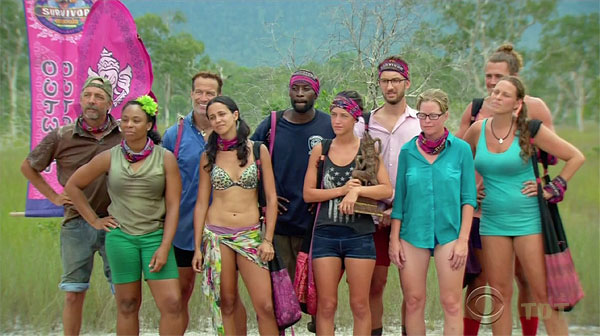
- 1. Joe — I just don’t get Joe. He knows he needs to blend in and not stand out. He’s a Survivor fan so he knows there will be some tribe shakeups. Yet he can’t help himself. Stephen said it best this week: Keep Joe till the merge and then get rid of him right away. Before the season, Probst laid out a list of people that could not win this season. Can a player like Joe ever win Survivor nowadays? I mean, Joe is kind of Colby-esque, and I really wonder if this type player can win anymore. I don’t think so.
- 2. Jeremy — Poor Jeremy, he can’t even take some personal time without people questioning his motives. Seriously, though, I’m still really liking Jeremy’s place in the game. I just wonder how adaptable he is because with the tribe swap coming, it could be the end of him if can’t adapt.
- 3. Ciera — I still only know that Ciera voted her mom out. Still waiting to hear something else …
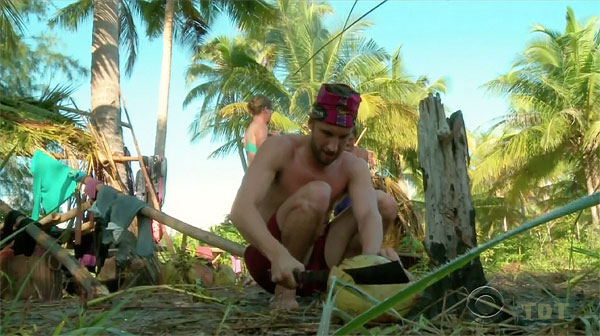 4. Stephen — So when Stephen’s out in the woods, everyone questions whether he’s looking for an idol. That’s cool. When Stephen questions someone else, wondering if they’re, um, playing the game, he’s a horrible human being. Got that? Good. That’s Manly Man™ logic.
4. Stephen — So when Stephen’s out in the woods, everyone questions whether he’s looking for an idol. That’s cool. When Stephen questions someone else, wondering if they’re, um, playing the game, he’s a horrible human being. Got that? Good. That’s Manly Man™ logic.- 5. Tasha — I loved how after Kass, in an interview, said she likes the people on this season compared to her first one, producers immediately went to a shot of Tasha. Brilliant guys.
- 6. Kimmi — Didn’t really see Kimmi this week. I guess once the focus leaves Abi, Kimmi will blow up? It’s got to happen. I mean, there’s a reason Survivor brought back Kimmi Kappenberg.
- 7. Kass — Kass may be playing a better game this season, but it won’t matter. She’s going home soon. In fact, I predict she’s gone next week. I hope she sticks around and causes some of her trademark “chaos,” but I don’t think it’s happening.
- 8. Keith — We didn’t really see Keith much this episode. I guess he was in the woods spitting a lot. Keith likes to spit. And he don’t do no yoga. And ain’t none of these women flirting with ol’ Keith.
- 9. Monica — I’m feeling really good about my winner pick. I know what you’re thinking: “Pat, how can you feel good since Monica is barely shown?” Well, I thought Monica would win through stellar, under-the-radar gameplay. Now I think she’ll win by default. Nobody even knows she’s there, so she can’t be voted out. Keep doing what you’re doing, Monica.
- 10. Andrew — I did rewatch Pearl Islands once, about seven years ago or something. I knew there was something I didn’t particularly care for about Savage, but I couldn’t quite remember it. But, of course, it all came rushing back this week. Sanctimonious and pompous egotism. That’s it. Yep, Savage gets to judge people for playing a game differently than him. Or maybe this is all next-level strategy? I have no idea. It’s like, on the surface he seems like a good guy, another version of Terry, but then he personally attacks folks. We’ll see.
OK. Man, that’s it. Let’s do this again next week. Deal?
 Pat Ferrucci started watching Survivor when episode two of Borneo first aired. He’s seen every episode since. Besides recapping here, he’ll be live-tweeting this season from the Mountain Time Zone. Why? Because nobody cares about the Mountain Time Zone except when they want to ski. Follow him @patferrucci for Survivor stuff and tweets about anything and everything that enters his feeble mind.
Pat Ferrucci started watching Survivor when episode two of Borneo first aired. He’s seen every episode since. Besides recapping here, he’ll be live-tweeting this season from the Mountain Time Zone. Why? Because nobody cares about the Mountain Time Zone except when they want to ski. Follow him @patferrucci for Survivor stuff and tweets about anything and everything that enters his feeble mind.
- Index of articles
- Pre-season preview
- Ep.1: Vytas, SIT down
- Ep.2: Varner teaches the Old School
- Ep.3: Tasha sets the Tribal agenda
- Ep.4: Abi continues cultivating an irrational gameplan
- Ep.5: Let's get ethical
- Ep.6: Follow the leader... or not
- Ep.7: Framing how it all went down
- Ep.8: Second Chance primed for an incredible end game
- Ep.9: Did Stephen just open or close the gate to winning?
- Eps.10-11: Construction junction, how do you function?
- Ep.12: Spiraling toward what could be an amazing end
- Ep.13: Planning behavior before the finale
- Ep.14: Wrapping up a stellar season